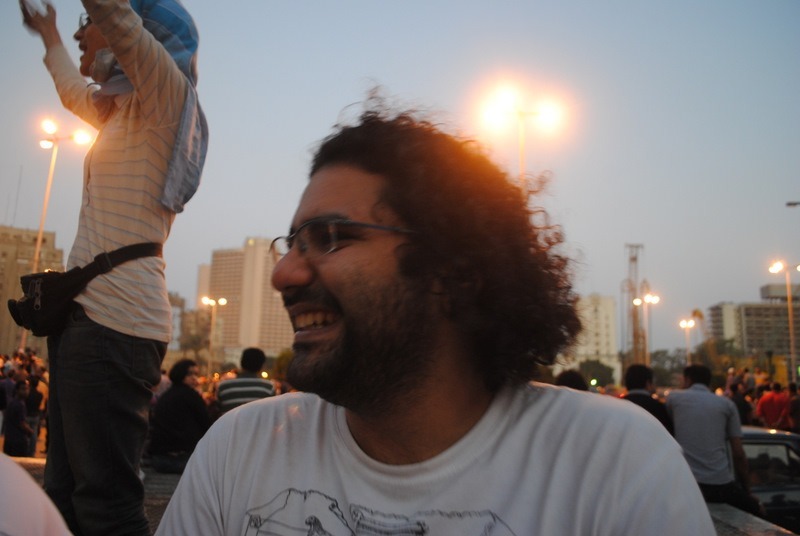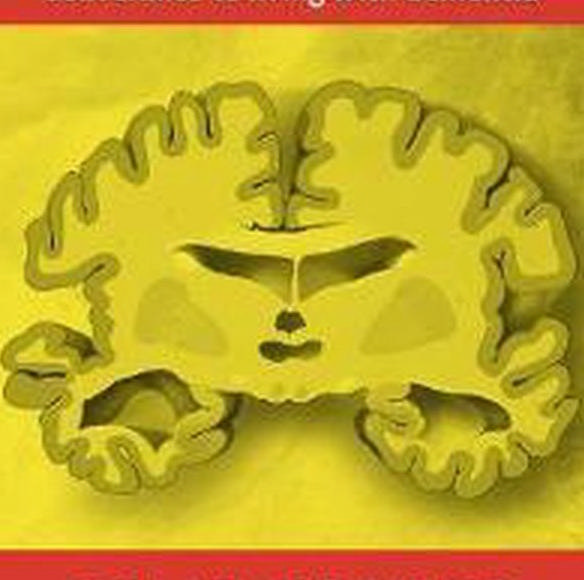
Alaa Abd El-Fattah has been the Egyptian government’s political prisoner for almost a decade. The activist, blogger and software developer has been denied his basic rights and tortured during his detention. He has now passed his 117th day on hunger strike. Alaa’s sister, Mona Seif, began her own hunger strike in solidarity with her brother on 12 June. Alaa’s family has recently lost contact with him. The last time they heard from him was in a letter dated 16 July, which they received a week late. They are extremely concerned for his wellbeing. Each day, Alaa’s mother, Laila Soueif, waits outside the prison in which he is detained, hoping for news about her son. Alaa became a British Citizen last year and his sisters, Mona and Sana Seif, are campaigning tirelessly for their brother, demanding the UK Foreign Secretary, Liz Truss, take urgent action to secure his release.
Last year, a book of Alaa’s writings was published by Fitzcarraldo. In his powerful, poetic essay, “Everybody Knows”, which seemed to fall out of the centre of You Have Not Yet Been Defeated, so powerful was its effect on me, Alaa catalogues the horrors of the counter-revolution that are known to all and yet persist unchallenged: “the prisons are full of dissidents”, the laws on the basis of which protesters are convicted and imprisoned are “unconstitutional”, “prisoners are denied their basic rights, are mistreated on arrest, while being interrogated, and in detention”. “Everybody knows that everybody knows this”, Alaa writes, and yet “the state still claims that Egypt has no political prisoners, no torture, no targeting of dissidents or journalists, no random arrests, no oppression”. But Alaa’s frustration, though he is himself one of the state’s denied political prisoners is not directed primarily at the state. “I don’t understand”, he writes, “why the authorities need to put on this whole performance, since everybody knows – and clearly the majority don’t mind. Nor do I understand why so many public figures, media personalities, party leaders, journalists, writers and presidential candidates still play along”.
Even these prominent individuals, who might be expected to speak out in the face of the well-known daily violations of the Egyptian state, are not Alaa’s chosen interlocutors. No, he looks to us, sitting here, free, our vision unobstructed by the walls of a prison cell, reading his words – whether at the time he first wrote them in March 2014, or today when their urgency is no less pressing – and he asks us about our silence, our complicity, our inaction in spite of what we know. “[W]hat about you?” he asks “You who are against these injustices and are still on the outside? What will you do?...Will you abandon us? Will you tell yourself it’s only temporary?”
Perhaps these words in response to Alaa’s questions are not what is needed, action rather, but I have written them in the hope of offering an answer to Alaa. Why is it that so many of us know and yet struggle to speak, to act? The content of such an answer is always inexcusable, but also always complicated, in need of drawing out, as Alaa has done from me, in need of articulating, in the hope that words, writing, might be the beginning of an answer, the beginning of action.
Tahrir Square and the counter-revolution
During the first eighteen days of the January 25th revolution, those heady days of occupation in 2011 that led to military dictator, Hosni Mubarak’s resignation, I lost count of the number of times I almost dropped everything to go to Cairo to join the protests in Tahrir Square. My parents left Egypt in 1978 and I was born in Exeter, the city where they found work and settled. Their difficult relationship with the country they left, their exhaustion with its authoritarianism and religious conservatism, combined with the expense of taking me and my two siblings to Egypt, meant I didn’t visit the country until I was 12. What held me back from travelling when the 2011 uprising began was a sense that it could never be my fight, that my parents’ neglect of the country, my vicarious neglect, meant that I wasn’t entitled to call the struggle my own. And there was my tongue. My stunted Arabic language betrayed my outsider status. For months I suppressed my instinct to travel and sat wired to the news, buffeted by elation, guilt and resentment.
But over the next two years I contrived ways of travelling to Cairo at every opportunity. Like Alaa, I fell in political love with the country. Yet the horror that unfolded as counterrevolutionary forces crushed the uprising and eliminated the space for political contestation had me turning away from Egypt again. My dear uncle’s death coincided with the beginning of this disastrous and deadly process, heightening my sense of severance from the country. I felt shame at my naivety, my ignorance. As if Egypt had not always been a nightmare. As if it was not the nightmare that revolutionaries had lived and fought, in the desperate hope that they and their children might wake up from it once and for all. A slogan I’d seen graffitied on a wall in Tahrir Square would not leave me: “If you will not let us dream, we will not let you sleep”. I had never really understood quite what was at stake in all my marching and chanting.
In July 2013, military forces carried out a coup, overthrowing and imprisoning Egypt’s first elected president, the Muslim Brotherhood’s Mohammed Morsi. It wasn’t long before new elections took place and El-Sisi, Commander in Chief of the armed forces and architect of the coup, was elected president. He won on a counter-revolutionary ticket: the promise of security and stability, an end to the revolution. El-Sisi quickly banned any form of protest, tarnishing activists with the label of “terrorist”. He ordered the rounding up of thousands of young people who had taken part in demonstrations or posted on social media in support of the struggle for “bread and freedom”. Soon, those who had reported on or photographed the uprising were also arrested. After a while, the lawyers who had taken up their cases were detained and charged. Friends went to prison. Others went into hiding or looked for ways to leave the country. Those for whom escape was impossible sunk into depression, grieving the revolution’s martyrs, its failure, living in fear of the state’s knock at their door.
Those who came and went risked being arrested on arrival, presented with photographs of themselves protesting at Egyptian embassies in their home countries. After Giulio Regeni, an Italian PhD student at Cambridge University, was detained, tortured and killed by security forces on 25th January 2016 while doing fieldwork in Cairo, my father told me I was never to set foot in the country again. A year later, the popular Lebanese band, Mashrou’ Leila, played a gig in Cairo at which fans raised rainbow flags in solidarity with the band’s championing of gay rights. After the gig, seven people who were photographed waving flags were arrested for “promoting sexual deviancy”. One of them, a lesbian writer and activist, Sarah Hegazi, never recovered from the three months of torture she suffered in prison. After her release, she fled to Canada where she was granted asylum and where she ended her life on 14th June 2020. A wider crackdown on Cairo’s gay community followed the gig with home raids and arrests of people suspected of being in same sex relationships.
It wasn’t my father’s order I heeded in not returning. It was grief for my uncle – I couldn’t imagine the country without him – and my cowardice in the face of the counter-revolutionary crackdown. I convinced myself I had only ever been a tourist of the revolution. I felt I’d abandoned my friends and the struggle, retreating to the safety of a first world home.
A call to action
This is the position from which I write today, in response to reading You Have Not Yet Been Defeated. A place of guilt, of quiet, of grief, of fear, from which Alaa’s book has shaken me – tugging me back into the time and place of the uprising, its crushing defeat, its past, its ongoing horrors, its multiplying injustices. His voice, the same voice that the Egyptian state has tried to silence time and again, sings from the pages of this book, powerfully and poetically, in essays full of ideas, strategy, energy, questions – all thought and articulated from behind bars for us, for us to read and answer with our own voices, our individual and collective action. That fact alone – that so many of these words were written from inside a prison, a place most of us have never known and think we will never know – seems to me to demand that we listen. We must heed Alaa’s call to remember that we are still, for the moment, free: free to speak and to act, not just in solidarity with Alaa and all of Egypt’s other political prisoners, but on all the other issues that occupy his mind, his heart and his writings – whether poverty, detention, torture, war, the climate crisis or Palestine.
I read Alaa’s book after being invited to speak in response to it at an event on prisoners’ writing. It was a strange feeling to spend so much time with Alaa, in the company of his book and his words, to have gone to the event, ready to speak, to engage, to talk with him about his ideas, his pain, his passion – and then, of course, to find Alaa not there, to remember that his book was written behind bars, compiled and translated by his friends in his physical absence and then talked about and discussed the world over in rooms Alaa cannot enter. He cannot leave the cell where he is captive, with only his body, its starvation, as a mode of resistance. I felt foolish and guilty for regretting the fact of his absence from a room – a minor room, a virtual room – when, for almost a decade, Alaa’s family have been forced to sit down to eat without him, to wake up without him, to wish him a silent good night, to go about all the daily intimate and mundane tasks which somehow make life meaningful without Alaa, all the while giving everything they have to the fight for his freedom and that of others.
The final refrain from Alaa’s essay, “Everybody knows” is, “Everybody knows there is no hope for us who have gone ahead into prison except through you who will surely follow. So what are you going to do about it?” You Have Not Yet Been Defeated is a remarkable work, not only in the force and beauty of Alaa’s writing, but in the fact of its existence, its having been written and compiled under the very circumstances intended to prohibit its being. We have not yet been defeated. We can begin to know this fact, to live this knowing, by supporting the campaign to free Alaa.

